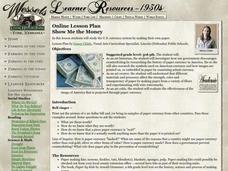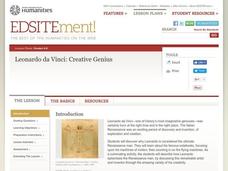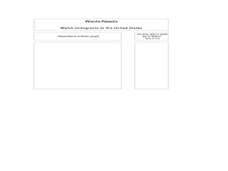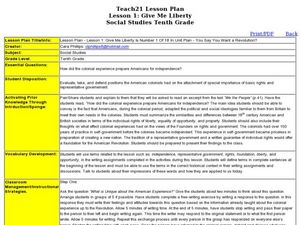Curated OER
THE TRAVELS OF BABAR: An Adventure in Scales
Students locate and identify the seven continents. They use longitude and latitude in establishing a location. Students enhance the knowledge of geographical location with cultures. Individuals or small groups research multiple aspects...
Curated OER
Let Your Motto Be Resistance: African American Portraits: Grades 3-5
Students explore the contributions of African Americans of the 20th century. In this African American history lesson, students examine portraits of Muhammad Ali, Romare Bearden, Lorraine Hansberry, Judith Jamison, and Leontyne Price in...
Curated OER
Show Me the Money
Students investigate the history of paper currency in the United States and consider anti-counterfeit strategies that are used by making their own paper.
Curated OER
Tolerance in Times of Trial
Students view the treatment of people of Japanese and German descent during World War II. They explore the problems in assigning blame to populations during times of war. They identify modern examples of discrimination and stereotyping.
Curated OER
Employee Payroll Simulation
Students simulate creating and calculating employees payrolls using hourly wages, deductions, and proper taxes.
Curated OER
Post-Modernism and Mass Culture
Young scholars examine the suggestion that the subjective experience of everyday life and sense of identity has changed in America in recent years. In this post-modernism and mass culture lesson plan, students engage in 4 multi-step...
Curated OER
America, A Home for Every Culture
Students investigate the many cultures that are represented in America. In this American culture lesson, students look at the food, languages, music, and traditions that immigrants have contributed to the face of America. They complete...
Curated OER
Leonardo da Vinci: Creative Genius
Students examine how Leonardo da Vinci exemplified the Renaissance period. They explore various websites, conduct Internet research, complete a chart, explore virtual da Vinci notebooks, and write an essay.
Curated OER
WHERE DOES OUR FOOD COME FROM?
Students examine the sources, location and availability of local food, develop mapping skills, interact with Elders to gain pertinent information, and examine subsistence issues of the past and present.
Curated OER
Talking Rocks
Third graders explain the difference between Petroglyphs and Pictographs from Ancient Native American peoples. They create symbols that are representative of a story about their world.
Curated OER
Immigrants: Yester and Today
Seventh graders brainstorm ideas why it is necessary to have a Resident Alien Id card. They complete a KWL chart on what they know about immigrants.
Curated OER
Push/Pull Factors and Welsh Emigration
Students view and discuss short sections of movies that relate to immigration. Working in groups, students create a map that shows directions of internal migration in their assigned geographical area. Students review ads/booklets created...
National First Ladies' Library
On the Road, on the Sea, in the Air: Women and Transportation
Learners research women who made history in development of different forms of transportation, including boats, railroads, automobiles, airplanes, and space shuttles, and create timeline/collage depicting some of their contributions.
Curated OER
Virtual Travel Plan
Students navigate the web to prepare for an imaginary trip and record expenses involved. In this state culture and symbol lesson, students gather information to be used in a multimedia project.
Curated OER
Foods and Languages of the World
Students learn about the foods of Italy. In this Italy lesson, students learn about the different types of food from Italy, create their own pizzas using paper and markers, share their pizzas with the class, and go to the cafeteria and...
Curated OER
The Berenstain Bears Trouble with Money
Students will explore good and services, income and saving listening to the story The B. Bears Trouble With Money. In this early economic lesson, students discuss what it means to earn money doing services and save money to...
Curated OER
My Very Own Washington Exhibition
Students work as curators. In this George Washington lesson, students research primary and secondary sources in order to create their own exhibitions of the first president. Students may visit selected Web sites in order to create their...
Curated OER
Women in Africa: Tradition and Change
Learners examine a selection of traditional African artwork that portray women and explore postcolonial African literature created by women in order to gain insight into the lives of some black women in Sub-Sahara Africa.
Curated OER
Creative Voices of Harlem
Learners explore the Harlem Renaissance. In this American history lesson, students examine a poem by Langston Hughes and identify the characteristics of the Harlem Renaissance. Learners research and report on a famous Harlem artist.
Curated OER
The Legacy of Rome
Students choose an element of Roman society they feel has had the most impact on modern society. Students then trace how that particular element has evolved over time and how it has influenced the development of its present equivalent...
Curated OER
Cartoons for the Classroom: Dark Voice
In this current events activity, students analyze a political cartoon by African-American Oliver Harrington and respond to 3 talking point questions.
Curated OER
Give Me Liberty
Fourth graders investigate the lives and societal contributions of Patrick Henry and Sojourner Truth. They complete a series of lessons that compare and contrast the biographies, historical context and work of these two revolutionaries.
Curated OER
Cole Porter: You're the Top
Students watch selected film clips about Cole Porter and discover his uniqueness. In groups, they research associates of the Porter's and present reports on them. Then, they write position papers on prominent people of the Jazz Age. ...
Curated OER
What's Behind that Mask?
Students use a "spider web" graphic organizer to record information about different types of masks they are familiar with. They write a paragraph about masks. Students read about Native American cultures and compare/contrast the...

























